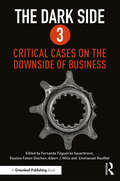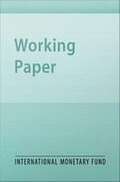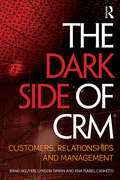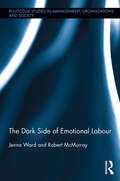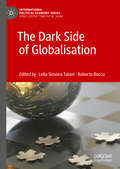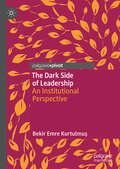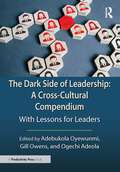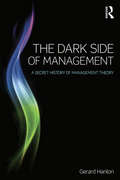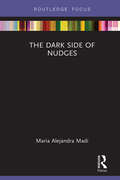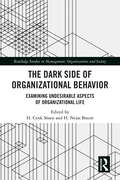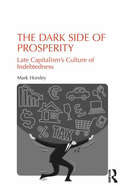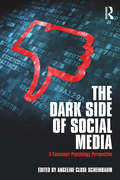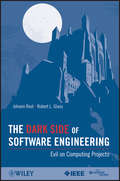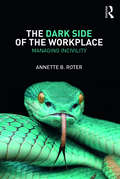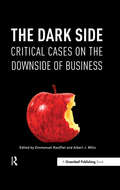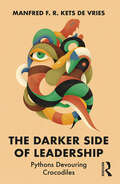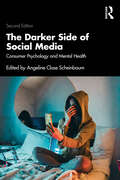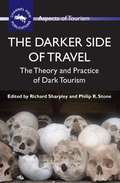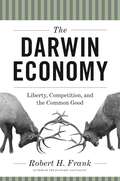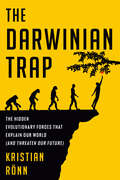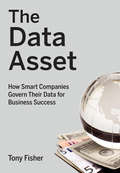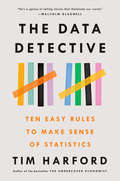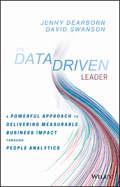- Table View
- List View
The Dark Side 3: Critical Cases on the Downside of Business
by Albert J. Mills Pauline Fatien Diochon Fernanda Sauerbronn Emmanuel RauffletThis third collection of outstanding contributions from the Critical Management Studies (CMS) Division of the Academy of Management (AOM) continues to challenge business practice in ways not tackled by other more typical business case studies. There is a critical need for business educators to expose students and managers to the multifaceted phenomena of doing business in the twenty-first century; to support critical, reflective moral development; and to reflect and understand the complexities of organizational life. Is the system broken? Is there need for more systemic change? The cases explore a number of critical issues at some of the largest industries and companies in the world, including wealth creation and human rights in mining, the CSR approaches at Coca-Cola, the palm oil industry, and the supply chain at Apple Inc. Online Teaching Notes to accompany each chapter are available on request with the purchase of the book.
The Dark Side of Bank Wholesale Funding
by Lev Ratnovski Rocco HuangA report from the International Monetary Fund.
The Dark Side of CRM: Customers, Relationships and Management
by Bang Nguyen Ana Isabel Canhoto Lyndon SimkinCustomers are treated badly. Not all customers. Not always. But many are and often. Some customers are bad. They treat firms badly. Firms have to react. Employees and customers endure the consequences. Such bad behaviours, by firms and customers, have consequences for perceptions of trust and fairness, for endorsements and referrals, for repeat purchasing and loyalty, and ultimately for a firm’s profitability and RoI. The management of customer relationships is core to the success and even survival of the firm. As The Dark Side of CRM explores, this is an area fraught with difficulties, duplicitous practice and undesirable behaviours. These need acknowledging, mitigating and controlling. This book is the first of its kind to define these dark sides, exploring also how firms and policy-makers might address such behaviours and manage them successfully. With contributions from many of the leading exponents globally of CRM and understanding customers, The Dark Side of CRM is essential reading for students, researchers and practitioners interested in managing customers, relationship marketing and CRM, as well as social media and marketing strategy.
The Dark Side of East London
by David CharnickJust hearing the phrase the East End summons up images of slums and dark alleyways, with Jack the Ripper appearing from the mist, or housing estates and pubs where you might find the Kray twins. It is a place of poverty and menace, yet these images can prevent us from seeing the reality of life east of the City of London, and of its dark history. This study features stories of crimes and misdeeds that show what life was like in this area before the 'East End' existed. They also reflect the changes caused as the settlements of the Tower Hamlets became absorbed by the new metropolis of London.As there is nothing new under the sun, so these stories find their modern counterparts in our times. However, they also take us into unfamiliar territory as they bring to light the often forgotten past that underlies the present-day streets and lurks behind the faades of some of the areas older buildings. Many of the stories will be unfamiliar and indeed strange, but yet they show how the character and notoriety of the Citys famous shadow has been formed. Paying scrupulous attention to place, this volume features a wealth of specially-commissioned photographs, allowing the reader to locate these stories in the present-day London Borough of Tower Hamlets.
The Dark Side of Emotional Labour (Routledge Studies in Management, Organizations and Society)
by Jenna Ward Robert McMurrayThe Dark Side of Emotional Labour explores the work that the rest of society would rather not think about, the often unseen work that is emotionally disturbing, exhausting, upsetting, and stigmatising. This is work that is simultaneously undesirable and rewarding, work whose tasks are eschewed and yet necessary for the effective function of individual organisations and society at large. Diverse and challenging, this book examines how workers such as the doorman, the HR manager, the waiter and the doctor’s receptionist experience verbal aggression and intimidation; how the prison officer and home carer respond to the emotions associated with physical violence, and; how the Samaritan, banker and veterinarian deal in death and despair. It also considers how different individuals develop the emotional capital necessary to cope with the dark side of emotional labour, and how individuals can make sense of, and come to take satisfaction and pride in, such difficult work. Finally, the book considers what is to be done with darker emotional work, both in terms of the management and care of those labouring on the dark side. Challenging and original, this book gives a voice to those who undertake the most demanding work on our behalf. It will be of interest to researchers and students of organisation studies and its related fields, and to every one of us who is called on to work or manage on the Dark Side.
The Dark Side of Globalisation (International Political Economy Series)
by Leila Simona Talani Roberto RoccuFirmly rooted in the International Political Economy (IPE) tradition, this book addresses the negative consequences of globalisation, what is termed here the ‘dark side of globalisation’. It explores different definitions of globalisation, whether the globalisation we have seen since the 1970s is substantially new, and to what extent it can be governed. Building on these foundations, the work assesses the prospects for de-globalisation. By focusing on this dark side of globalistion, the authors show how the global economic crisis, and its various local and sectorial manifestations, intensified – rather than generated – existing trends. This scholarship provides an account of the current predicament that is both more complex and more persuasive than the opposition between globalisation and de-globalisation.
The Dark Side of Leadership: An Institutional Perspective
by Bekir Emre KurtulmuşContrary to the notion that leaders contribute to positive behaviour within organisations, this book reflects growing interest in the ‘dark side’ of leadership: the unethical and immoral personalities that can reside in positions of power. Drawing on empirical and theoretical analysis, the author examines immorality within leadership and the underlying causes behind this behaviour. Focusing on the impact of institutional pressures, this book analyses how such behaviour is influenced by internal and external factors. By employing a theoretical framework, the author seeks to demonstrate that institutions either compel leaders to be ethical and moral, or in contrast, they actually provide legitimacy for immoral actions. An insightful and thought-provoking read, The Dark Side of Leadership will be of interest to those studying leadership, HRM, and business ethics, as well as social psychology scholars.
The Dark Side of Leadership: With Lessons for Leaders
by Ogechi Adeola Adebukola Oyewunmi Gill OwensThe corporate landscape is rife with instances of leaders who have left a trail of sinister outcomes.In the last three decades, the research in leadership and organisational sciences has expanded in theoretical and typological breadth to include the dark side. These works have aimed at uncovering the complex interplay of personalities, power dynamics, and organisational cultures that can lead to destructive and unethical behaviours in the workplace. While there are volumes of literature on leadership, there is a dearth of research that integrates dark leadership and cross-cultural norms, perspectives, variances, and interventions. The Dark Side of Leadership: A Cross-Cultural Compendium is a collaborative and transdisciplinary venture that draws on the knowledge and experiences of practitioners and scholars across the globe to explore the contentious and evolving subject of dark leadership. The primary consideration of this book is to explore dark side leadership conceptualisations and manifestations across contexts and provide insights into traits, processes, and outcomes, as well as interventionist paradigms. Hofstede’s research demonstrates the fundamental role of national and organisational culture in shaping leadership behaviour. This book comprehensively documents cross-cultural cases, perspectives, and research on the dark side of leadership.
The Dark Side of Management: A Secret History of Management Theory
by Gerard HanlonWhat isn’t management and why doesn’t it matter? This compelling book leads the reader away from the stories told by managers and management theories to show the secret history of the field. In characterizing the progress of management as a war on workers, this book offers a controversial and revealing alternative intellectual history of this overwhelming discipline. The author employs a unique range of theories and sources, including the founding fathers of management, US labour and social history, and earlier intellectual figures such as Marx and Weber alongside the contemporary insights of Foucault and European and American workerist and post-workerist thought, to shed light on the world of management. This book is key reading for researchers and students across the social sciences. With a controversial and stimulating approach, it also engages readers with a general interest in business and management issues.
The Dark Side of Nudges (Routledge Frontiers of Political Economy)
by Maria Alejandra MadiThe concept of "nudging" has hit news headlines in recent years following the implementation of nudge policies in many parts of the world, the establishment of behavioural policy units in some countries, and the award of the Nobel Prize in Economics to the behavioural economist Richard Thaler in 2017. However, questions remain about whether nudging is an optimal approach to policy-making. This book presents a critical approach to the study of nudging to highlight the foundations, rationale and effects of current policy-making trends in the neoliberal age of behavioural economics. In this provocative book, the author presents a re-examination of the methodological foundations of behavioural economics and its consequences for addressing the deep social and economic policy challenges of our times. It is argued that, although the concept of nudge proposed by Richard Thaler and Cass Sunstein rejects the theorization of economic behaviour under models of strict rationality, nudge policies focus on methodological individualism in economic thinking and economic policy. The complexity of social and economic policy problems of the twenty-first century calls for a revision of our conceptual outlooks, and to increase recognition of the failure of methodological individualism in economics to address the unprecedented social, political, and environmental challenges of globalization. Offering a new take on the epistemological assumptions underlying behaviourally-informed policies, this book will prompt the general public to consider new ideas about the darker side of behavioural economics.
The Dark Side of Organizational Behavior: Examining Undesirable Aspects of Organizational Life (Routledge Studies in Management, Organizations and Society)
by H. Cenk Sözen H. Nejat BasımThe Dark Side of Organizational Behavior aims to gather all the micro and meso level topics about the dark side of organizations that may guide management practitioners, researchers, and students. The history before the modern human civilization is full of multiple types of conflicts, wars, struggles and violence. Modernization project has constructed a desired reality of human being and has somehow concealed the dark side of human interactions. Through this outlook, this book explores the realities of the dark side of organizations and how these realities may have the potential to change previous assumptions about business life. The field of Organizational Behavior is dominated by the positive aspects of the business life, but conflict, war, struggle, and violence have always been a part of history. It is not possible to isolate organizational participants from negative emotions like hostility, dislike, hate, jealousy, rage, and revenge. A manager may devote most of their time to cope with conflicts, deviant behaviors, ambitious individuals, gossips, and dysfunctional rivalry among employees. It is evident that negative events and interactions among employees cost more time and energy for a manager than the positive side of organizational life. Therefore, exploring the realities of the dark side of organizations may have the potential to change previous assumptions about business life. This book will be of interest to researchers, academics, practitioners, and advanced students in the fields of organizational studies and behavior, human resource management, employment relations, and organizational psychology.
The Dark Side of Prosperity: Late Capitalism’s Culture of Indebtedness
by Mark HorsleyThis book offers a critical analysis of consumer credit markets and the growth of outstanding debt, presenting in-depth interview material to explore the phenomenon of mass indebtedness through the life trajectories of self-identified debtors struggling with the pressures of owing money. A rich and original qualitative study of the close relationship between financial capitalism, consumer aspirations, social exclusion and the proliferation of personal indebtedness, The Dark Side of Prosperity examines questions of social identity, subjectivity and consumer motivation in close connection with the socio-cultural ideals of an ’enjoyment society’ that binds the value of the lives of individuals to the endless acquisition and disposal of pecuniary resources and lifestyle symbols. Critically engaging with the work of Giddens, Beck and Bauman, this volume draws on the thought of contemporary philosophers including Zizek, Badiou and Rancière to consider the possibility that the expansion of outstanding consumer credit, despite its many consequences, may be integral to the construction of social identity in a radically indeterminate and increasingly divided society. A ground-breaking work of critical social research this book will appeal to scholars of social theory, contemporary philosophy and political and economic sociology, as well as those with interests in consumer credit and cultures of indebtedness.
The Dark Side of Social Media: A Consumer Psychology Perspective
by Angeline Close ScheinbaumThe Dark Side of Social Media takes a consumer psychology perspective to online consumer behavior in the context of social media, focusing on concerns for consumers, organizations, and brands. Using the concepts of digital drama and digital over-engagement, established as well as emerging scholars in marketing, advertising, and communications present research on some unintended consequences of social media including body shaming, online fraud, cyberbullying, online brand protests, social media addiction, privacy, and revenge pornography. It is a must-read for scholars, practitioners, and students interested in consumer psychology, consumer behavior, social media, advertising, marketing, sociology, science and technology management, public relations, and communication.
The Dark Side of Software Engineering
by Robert L. Glass Johann RostBetrayal! Corruption! Software engineering?Industry experts Johann Rost and Robert L. Glass explore the seamy underbelly of software engineering in this timely report on and analysis of the prevalance of subversion, lying, hacking, and espionage on every level of software project management. Based on the authors' original research and augmented by frank discussion and insights from other well-respected figures, The Dark Side of Software Engineering goes where other management studies fear to tread -- a corporate environment where schedules are fabricated, trust is betrayed, millions of dollars are lost, and there is a serious need for the kind of corrective action that this book ultimately proposes.
The Dark Side of the Workplace: Managing Incivility
by Annette B. RoterThe workplace can be a hotbed of difficulty and incivility—from rumors spread about an individual, to the agonies of stress, to physical attacks and even death. Evidence suggests that not only does incivility have significant implications for employees, organizations and society, it is also on the rise. In recent years we have experienced increased acts of incivility in the workplace, social media and government positions. There is a direct correlation between uncivil behavior and financial outcomes for organizations. It is estimated that stress related to uncivil actions in the workplace costs organizations approximately $300 billion annually. The cost of personal implications for employees is often too high to calculate as individuals experience loss of reputation and significant psychological and physical distress. With the increased use of social media, individuals are experiencing incivility that crosses the boundary between their personal and professional lives. This book delves into the darker side of the workplace, discussing bullying, toxic work environments, corporate psychopaths, the struggles of stress, and more. It combines recent research and case studies to provide an understanding of these behaviors, and offers practical solutions on how to cultivate a healthy working environment.
The Dark Side: Critical Cases on the Downside of Business
by Albert J. Mills Emmanuel RauffletThe discredit of a certain brand of capitalism – and the managers that practice it – continues apace. The increasing lack of tolerance for short-term thinking and a systematic neglect of the social, regulatory, and economic conditions in which business ought to operate means we are entering a time of trouble and questions – an era of economic, social, and environmental turbulence. There is a critical need for business educators and trainers to expose students and managers to these issues to examine, explore, and understand the different multifaceted, complex phenomena of our late capitalist era. There is also a need to foster a climate for future and current business managers to reflect, feel, and think differently both ethically and cognitively. The 16 innovative case studies in The Dark Side: Critical Cases on the Downside of Business are designed for this very purpose: to provoke reflection and debate; to challenge and change perceptions; and to create responsible managers. The cases are innovative in two ways. First, in terms of content they acknowledge the diversity of actors and interests in and around organizations. They contain different levels of analysis, and propose different points of view and logics. They recognize that decisions that seem sound when they are made may actually contain the seeds of their later failure. Second, these cases are innovative in terms of format. Whereas most cases are formatted around decision-making situations, these are more diverse and open-ended. This stimulates the use of "judgment" – the capacity to synthesize, integrate, and balance short- and long-term effects, appreciate effects on different groups, and learn to listen and evaluate. Whereas decision-making is the key skill when confronting complicated issues and situations, "judgment-making" relies on experience and is a far better tool in the complex, murky, gray areas typical of business ethics. The cases included here are all finalists or award-winners from the first seven years of the Dark Side of Business Case Competition, a joint event of the Academy of Management's Critical Management Studies Section and Management Education Section. In many areas of management, case studies are almost exclusively devoted to "best practice" cases or difficult decisions faced by basically well-managed firms. When educators look for resources to illustrate to students the more typical cases, let alone the really scandalous practices of the worst firms, the cupboard is almost entirely bare. From the beginning, the Dark Side competition aimed at encouraging case studies that integrate socio-political issues with organizational dynamics, thus contextualizing organizational and management problems within the broader system of capitalism. These cases comprise a diverse and rich collection from a range of countries, continents, and issues and focus on interactions in business organizations as well as between business organizations and groups and societies. The Dark Side: Critical Cases on the Downside of Business is divided into four sections. The first sheds light on gray areas in the behavior of businesses. The second concerns the interactions between business and local communities in diverse countries. The third concerns crises, and specifically how firms may create or manage them. Finally, the fourth section concerns gray areas in business behavior in the global context. The Dark Side: Critical Cases on the Downside of Business will be an essential purchase for educators and is expected to be a widely used resource at all levels of management education.Online Teaching Notes to accompany each chapter are available on request with the purchase of the book.
The Dark Theatre: A Book About Loss
by Alan ReadThe Dark Theatre is an indispensable text for activist communities wondering what theatre might have to do with their futures, students and scholars across Theatre and Performance Studies, Urban Studies, Cultural Studies, Political Economy and Social Ecology. The Dark Theatre returns to the bankrupted warehouse in Hope (Sufferance) Wharf in London’s Docklands where Alan Read worked through the 1980s to identify a four-decade interregnum of ‘cultural cruelty’ wreaked by financialisation, austerity and communicative capitalism. Between the OPEC Oil Embargo and the first screening of The Family in 1974, to the United Nations report on UK poverty and the fire at Grenfell Tower in 2017, this volume becomes a book about loss. In the harsh light of such loss is there an alternative to the market that profits from peddling ‘well-being’ and pushes prescriptions for ‘self-help’, any role for the arts that is not an apologia for injustice? What if culture were not the solution but the problem when it comes to the mitigation of grief? Creativity not the remedy but the symptom of a structural malaise called inequality? Read suggests performance is no longer a political panacea for the precarious subject but a loss adjustor measuring damages suffered, compensations due, wrongs that demand to be put right. These field notes from a fire sale are a call for angry arts of advocacy representing those abandoned as the detritus of cultural authority, second-order victims whose crime is to have appealed for help from those looking on, audiences of sorts.
The Darker Side of Leadership: Pythons Devouring Crocodiles
by Manfred F. Kets de VriesManfred Kets de Vries is one of the most authoritative voices on organizational dynamics, leadership, executive coaching, and psychotherapy today. In all his roles, he has noticed that questions are now, increasingly, coming back to one thing – the wider state of the world. Using an engaging and highly readable style throughout the book, Manfred helps us to make sense of the confusing and, some might say, psychotic times in which we now live.Revealing the darker side of leadership, Manfred explores the tendency for people to adopt ‘sheeple’ or herd-like behavior, the populist threat that we are facing, the dangers that come with feelings of perceived injustice, the rise of dictatorships, and the impact of Leviathan (neo-authoritarian) leadership behavior. Guided by theoretical concepts, the book provides readers with a better understanding of the underlying forces that drive these phenomena to the surface. What are the psychological dynamics at play? Why do groups of people behave in this manner? Beyond merely diagnosing what’s happening, Manfred introduces various coping strategies to counteract the emergence of these regressive forces.The book offers a unique and original approach to answering the micro- and macro-psychological questions of how to mitigate against populism and autocratic leadership, and will be of interest to the general reader as well as the key audiences of organizational leaders, psychoanalysts, coaches, psychotherapists, sociologists and social psychologists.
The Darker Side of Social Media: Consumer Psychology and Mental Health
by Angeline Close ScheinbaumThe Darker Side of Social Media: Consumer Psychology and Mental Health takes a research-based, scientific approach to examining problematic issues and outcomes that are related to social media use by consumers. Now in its second edition, it relies on psychological theories to help explain or predict problematic online behavior within the social media landscape through the lens of mental health.With an aim to provide solutions, the authors spotlight the key issues affecting consumer well-being and mental health due to the omnipresence and overuse of social media. The book dissects the unintended consequences of too much social media use, specifying key problems like disconnection anxiety, eating disorders, online fraud, cyberbullying, the dark web, addiction, depression, self-discrepancies, and serious privacy concerns (especially impacting children or young people). The book provides grapples with mental health disorders such as anxiety, depression, self-harm, and eating disorders that can be intensified by, or correlated with, too much social media use. The authors meticulously review the various facets of the darker side of online presence and propose actionable solutions for each of the problems stated, providing scholars with a conceptual model with propositions for continued research.This international exploration of social media is a must-read for students of marketing, advertising, and public relations, as well as scholars/managers of business, marketing, psychology, communication, management, and sociology. It will also be of interest to social media users, those navigating new media platforms parents, policymakers, and practitioners.
The Darker Side of Travel
by Richard Sharpley Philip R. StoneOver the last decade, the concept of dark tourism has attracted growing academic interest and media attention. Nevertheless, perspectives on and understanding of dark tourism remain varied and theoretically fragile whilst, to date, no single book has attempted to draw together the conceptual themes and debates surrounding dark tourism, to explore it within wider disciplinary contexts and to establish a more informed relationship between the theory and practice of dark tourism. This book meets the undoubted need for such a volume by providing a contemporary and comprehensive analysis of dark tourism.
The Darwin Economy: Liberty, Competition, and the Common Good
by Robert H. FrankWhat Charles Darwin can teach us about building a fairer societyWho was the greater economist—Adam Smith or Charles Darwin? The question seems absurd. Darwin, after all, was a naturalist, not an economist. But Robert Frank, New York Times economics columnist and best-selling author of The Economic Naturalist, predicts that within the next century Darwin will unseat Smith as the intellectual founder of economics. The reason, Frank argues, is that Darwin's understanding of competition describes economic reality far more accurately than Smith's. And the consequences of this fact are profound. Indeed, the failure to recognize that we live in Darwin's world rather than Smith's is putting us all at risk by preventing us from seeing that competition alone will not solve our problems.Smith's theory of the invisible hand, which says that competition channels self-interest for the common good, is probably the most widely cited argument today in favor of unbridled competition—and against regulation, taxation, and even government itself. But what if Smith's idea was almost an exception to the general rule of competition? That's what Frank argues, resting his case on Darwin's insight that individual and group interests often diverge sharply. Far from creating a perfect world, economic competition often leads to "arms races," encouraging behaviors that not only cause enormous harm to the group but also provide no lasting advantages for individuals, since any gains tend to be relative and mutually offsetting.The good news is that we have the ability to tame the Darwin economy. The best solution is not to prohibit harmful behaviors but to tax them. By doing so, we could make the economic pie larger, eliminate government debt, and provide better public services, all without requiring painful sacrifices from anyone. That's a bold claim, Frank concedes, but it follows directly from logic and evidence that most people already accept.In a new afterword, Frank further explores how the themes of inequality and competition are driving today's public debate on how much government we need.
The Darwinian Trap: The Hidden Evolutionary Forces That Explain Our World (and Threaten Our Future)
by Kristian RönnA provocative exploration of how humans are wired to seek short-term success at the expense of long-term survival—an evolutionary &“glitch&” that explains everything from toxic workplaces to climate change&“Essential reading . . . a lively, ultimately hopeful examination of how incentivizing the wrong values and actions has led to some of our most intractable problems.&”—Eric Ries, New York Times bestselling author of The Lean StartupWhen people talk about today&’s biggest challenges—pollution, misinformation, artificial intelligence, inept CEOs, and politicians—they tend to frame the conversation around &“bad people&” doing &“bad things.&” But is there more to the story?Humans, it turns out, are intrinsically wired to seek short-term success at the expense of long-term prosperity. Kristian Rönn, an entrepreneur formerly affiliated with the University of Oxford&’s Future of Humanity Institute, calls these deeply rooted impulses &“Darwinian demons.&” These forces, a by-product of natural selection, can lead us to act in shortsighted ways that harm others—and even imperil our survival as a species. If this evolutionary glitch is left unchecked, the consequences will grow in magnitude as the power of technology accelerates.In this eye-opening work, Rönn shows that we must learn to cooperate in new ways if we are to escape these evolutionary traps in our daily lives and solve our biggest existential threats. Evolution may be to blame for the trap—but humans need not fall for it. Our salvation, he writes, will involve the creation of new systems that understand, track, and manage what humankind values most.Bold, brilliant, and ultimately optimistic, The Darwinian Trap gives readers a powerful new lens on our world and its problems, and invites us to rethink our priorities for the sake of generations to come.
The Data Asset: How Smart Companies Govern Their Data for Business Success
by Tony FisherAn indispensable guide that shows companies how to treat data as a strategic asset Organizations set their business strategy and direction based on information that is available to executives. The Data Asset provides guidance for not only building the business case for data quality and data governance, but also for developing methodologies and processes that will enable your organization to better treat its data as a strategic asset. Part of Wiley's SAS Business Series, this book looks at Business Case Building; Maturity Model and Organization Capabilities; 7-Step Programmatic Approach for Success; and Technologies Required for Effective Data Quality and Data Governance and, within these areas, covers Risk mitigation Cost control Revenue optimization Undisciplined and reactive organizations Proactive organizations Analysis, improvement, and control technology Whether you're a business manager or an IT professional, The Data Asset reveals the methodology and technology needed to approach successful data quality and data governance initiatives on an enterprise scale.
The Data Detective: Ten Easy Rules to Make Sense of Statistics
by Tim HarfordFrom &“one of the great (greatest?) contemporary popular writers on economics&” (Tyler Cowen) comes a smart, lively, and encouraging rethinking of how to use statistics.Today we think statistics are the enemy, numbers used to mislead and confuse us. That&’s a mistake, Tim Harford says in The Data Detective. We shouldn&’t be suspicious of statistics—we need to understand what they mean and how they can improve our lives: they are, at heart, human behavior seen through the prism of numbers and are often &“the only way of grasping much of what is going on around us.&” If we can toss aside our fears and learn to approach them clearly—understanding how our own preconceptions lead us astray—statistics can point to ways we can live better and work smarter.As &“perhaps the best popular economics writer in the world&” (New Statesman), Tim Harford is an expert at taking complicated ideas and untangling them for millions of readers. In The Data Detective, he uses new research in science and psychology to set out ten strategies for using statistics to erase our biases and replace them with new ideas that use virtues like patience, curiosity, and good sense to better understand ourselves and the world. As a result, The Data Detective is a big-idea book about statistics and human behavior that is fresh, unexpected, and insightful.
The Data Driven Leader: A Powerful Approach to Delivering Measurable Business Impact Through People Analytics
by David Swanson Jenny DearbornData is your most valuable leadership asset—here's how to use it The Data Driven Leader presents a clear, accessible guide to solving important leadership challenges through human resources-focused and other data analytics. This engaging book shows you how to transform the HR function and overall organizational effectiveness by using data to make decisions grounded in facts vs. opinions, identify root causes behind your company’s thorniest problems and move toward a winning, future-focused business strategy. Realistic and actionable, this book tells the story of a successful sales executive who, after leading an analytics-driven turnaround (in Data Driven, this book’s predecessor), faces a new turnaround challenge as chief human resources officer. Each chapter features insightful commentary and practical notes on the points the story raises, guiding you to put HR analytics into action in your organization. HR and other leaders cannot afford to overlook the power and competitive advantages of data-driven decision-making and strategies. This book reflects the growing trend of CEOs choosing analytics-minded business leaders to head HR, at a time when workplaces everywhere face game-changing forces including automation, robotics and artificial intelligence. It is urgent that human resources leaders embrace analytics, not only to remain professionally relevant but also to help their organizations successfully navigate this digital transformation. HR professionals can and must: Understand essential data science principles and corporate analytics models Identify and execute effective data analytics initiatives Boost HR and company productivity and performance with metrics that matter Shape an analytics-centric culture that generates data driven leaders Most organizations capture and report data, but data is useless without analysis that leads to action. The Data Driven Leader shows you how to use this tremendous asset to lead your organization higher.
